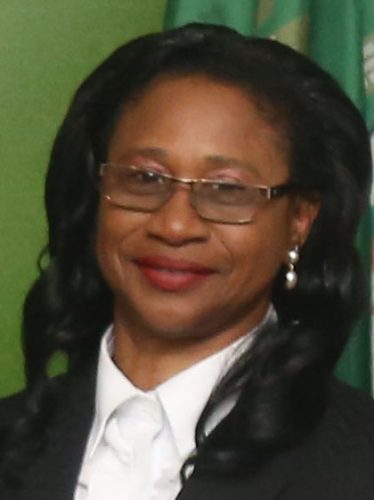The Guyana Court of Appeal, by a majority decision, yesterday overturned the January 31st ruling made by Chief Justice (ag) Roxane George-Wiltshire that the December 21st no-confidence motion against the APNU+AFC government was validly passed with 33 votes, saying that the correct mathematical formula for finding the “absolute” majority was not used.
Chancellor of the Judiciary (ag) Yonette Cummings-Edwards and appellate judge Dawn Gregory both agreed that 34 votes were required to guarantee the motion’s successful passage, while appellate judge Rishi Persaud dissented and endorsed the Chief Justice’s ruling.
“I am of the view that the formula advanced by Dr [Francis] Alexis is attractive in the circumstances,” Justice Cummings-Edwards told a packed courtroom during the almost three-hour long hearing.

The ruling was a final-hour reprieve for the government, which has been pressured by the parliamentary opposition PPP/C for the holding of new elections within a three-month deadline in keeping with Article 106 of the Constitution. The PPP/C, which had said that government would be illegal after the expiry of the deadline, yesterday said it would respect the court’s ruling but will file an appeal with Guyana’s final appellate court, the Caribbean Court of Justice (CCJ).
Dr Alexis, a Grenadian Queen’s Counsel, on behalf of the Guyana government, had submitted during oral arguments earlier this month that the incorrect formula had been utilised for calculating the votes to validate the passage of the motion. He had reasoned that in Guyana’s 65-member National Assembly, half would result in a fraction of 32.5. If it is to be rounded to the next whole number, that figure will be 33 and, in accordance with the practice and the application of the meaning of majority, one has to be added to calculate a majority.
In their rulings, which were delivered one day after the three-month deadline for the holding of elections in accordance with the passage of the motion elapsed, Justices Cummings-Edwards and Gregory noted there is a difference between a “simple” majority and an “absolute” majority. In the former, 33 votes will be required while in the latter, 34 was needed, they said. It was in this regard that they both allowed the appeals filed by Attorney General Basil Williams SC on behalf of the government.
Following the Chief Justice’s ruling, a total of five appeals were filed; two by Williams, two on behalf of General Secretary of APNU Joseph Harmon – who was added to the proceedings in the High Court as an interested party – and one on behalf of Compton Reid, a private citizen. The decisions in Harmon’s appeals were incorporated into the rulings given in the cases filed by Williams and Reid.
While Justices Cummings-Edwards and Gregory allowed Williams’ appeals, Justice Persaud dismissed them. In the Reid matter, Justices Persaud and Gregory dismissed the appeal, while Justice Cumming-Edwards allowed it in part.
The no-confidence motion, sponsored by Opposition Leader Bharrat Jagdeo, was declared passed by Speaker of the National Assembly Dr Barton Scotland following a vote in its favour by then APNU+AFC parliamentarian Charrandass Persaud on the night of December 21st.
Government had initially accepted that the motion was properly carried but later backtracked, claiming the need for an “absolute majority of 34” from the 65-member National Assembly, while also arguing that Persaud’s vote was invalid given his dual citizenship.
Justice George-Wiltshire in the High Court subsequently found that even though Persaud was a parliamentarian in violation of the Constitution, his vote was valid. She has also ruled that the passage should have triggered the immediate resignation of the Cabinet including the President.
The judges all agreed yesterday that the majority argument brought by Williams was the most prominent issue before them and though they read their decisions, they said that more refined, written versions will be made available at a later date.
Justice Persaud, who was the first to read his
ruling, agreed with the Chief Justice that the motion was validly passed with a required majority vote of 33.
“I base my interpretation on the clear and unambiguous wording of Article 106 (6),” he said, before later adding that despite the various authorities inclusive of periodicals and dictionaries which were presented to the court to explain what is meant by a majority, he rejected the notion that 33 was not the majority of 65.
He said his interpretation and the majority of 33 has long been used by the National Assembly without complaint. “Article 106 (6) does not provide for a mathematical formula in the determination of a majority. The plain meaning of the word must prevail as the drafters intended,” he said, before making reference to Articles 168 (2) and 168 (3), which provide that the vote will be lost if the votes of the members are equally divided. “The inferences are clear,” he stressed.
Further, he said that “the formula of first dividing by one half then rounding up to the nearest whole plus one has no application here. It does not accord with logic and common sense in situations where there is an uneven number of members unless that specific formula is prescribed.”
‘Anomalous’
Justice Gregory subsequently accepted the argument of Dr Alexis, saying that 33 could not be considered the absolute majority and that 34 was required for the motion to pass. She went further to note that the no-confidence vote required a different version of majority, that is absolute as opposed to simple.
After spending some time referring to Dr Alexis’s two-stage process, which entails the division by two which results in a fraction, followed by a rounding up and the addition of one, she said that for a simple majority, the count ends at the rounding up but for an absolute majority, the one must be added to give effect to the difference between the two in an odd-number Assembly.
According to the judge, this two-stage process gives “true effect” to the requirement in Article 106 (6) that the motion must obtain the vote of a majority of all the elected members of the National Assembly. “Bypassing the two-stage process and treating oddly with 33 as a greater number of 65 renders in my view a result that is anomalous,” she said.
“I am satisfied that 33 is flawed and untenable and is not an absolute majority of 65 members of the National Assembly as it falls short of the requirement in Article 106 (6),” she said before emphasising that a no-confidence motion in Guyana requires an absolute and not a simple majority to be passed.
“The motion did not pass with majority of 33 votes. It required a vote of 34,” she insisted.
Justice Cummings-Edwards, who spent a sizeable portion of her hour-long ruling addressing this issue, also expressed agreement with Dr Alexis’ calculation and expressed views similar to those of Justice Gregory.
She also insisted that there is a distinction between absolute majority and simple majority.
Noting that the language used in the provisions must be interpreted as a whole, she expressly agreed with the former AG’s calculation and said that 34 votes were required. She insisted that the resulting fraction in an uneven numbered National Assembly is an important factor that has to be considered since there is no half vote. It is in this regard that the rounding up principle becomes necessary.
‘Not a usurper’
Reid’s case challenged the validity of Persaud’s vote given his Canadian citizenship in defiance of the Constitution, which disqualifies a dual citizen from election to the National Assembly.
From the outset, Justice Persaud agreed with the Chief Justice’s ruling in this matter and he subsequently noted that the Constitution clearly outlines that a person holding dual citizenship is barred from being elected to the National Assembly.
He said that he agreed with the Chief Justice that there is a lack of evidence suggesting that Persaud knew he was not qualified to be elected. The judge pointed out that it seems that the other dual citizen Members of Parliament (MPs) were similarly unaware of their own status prior to the definitive pronouncement by Justice George-Wiltshire.
According to him, in the circumstances, Charrandass Persaud is clearly not a “usurper” and, as a result, he dismissed the appeal filed by Reid’s attorneys.
Justice Gregory, in also dismissing the appeal, said that having looked at the issue as a whole, she is not satisfied that his vote was a nullity. “His vote was valid and effective and was cast and was properly ruled to have been casted and was the thirty-third of the votes cast for the motion,” she said.
The judge said that although it was found that Persaud was disqualified, she found that Article 165 (2) applied to his participation in the proceedings on December 21st. “My view is that the proceedings including the debate and the subsequent vote, having been extracted from his party’s list and seated as a member of the National Assembly and participated in the proceedings, his participation was saved and the entire proceedings were saved including his vote,” she said before informing that she disagreed with arguments advanced by Reid’s attorney Neil Boston and Harmon’s attorney Roysdale Forde that the court should deem the vote a nullity and that the vote was severable from the rest of the proceedings and that this would have resulted in a tie.
“I believe that the vote was validly pass and I therefore dismiss Reid’s appeal,” she said.
‘Still valid’
The Chancellor, meanwhile, said in part that even if a member votes against his list, the vote is still valid.
“If one votes for another list without intimating to the Speaker or to his Representative of the List that he will not support the list or that he is supporting another list, that vote is still valid,” she said, having earlier pointed out that the Chief Justice was correct in her ruling that some of the questions sought fell under the special jurisdiction of the elections petition court.
The Chancellor would later liken Persaud’s vote to that of a footballer kicking the ball into his own goal. In such a circumstance, she said, that goal goes to the other team.
Justice Cummings-Edwards stressed that if the member remains in the National Assembly and votes, that vote is still valid and has to be counted.
During his ruling, Justice Persaud declined to grant an order sought by attorney Kamal Ramkarran, who is representing Christopher Ram, who had asked for a date for elections to be named. Ramkarran had filed a counter appeal asking for additional orders and amendments.
Persaud premised his decision on the clear mandatory wording of Article 106 (7), including the provision regarding the extension of the timeframe for the holding of elections and other aspects of the law which deal with the separation of powers doctrine.
He also agreed with the Chief Justice when she said that Cabinet’s resignation was an automatic causality of a successful no-confidence motion. Further, he posited that the Opposition Leader as an MP, had the right to file a motion of no-confidence.
“What it is called is likely only the result of who proposed it since a government member will call it a vote of confidence, while an opposition member will call it a vote of no-confidence. What matters is not what it is called but its substance, the procedure by which it is brought and the votes obtained on either side,” he said.
No costs were awarded.






